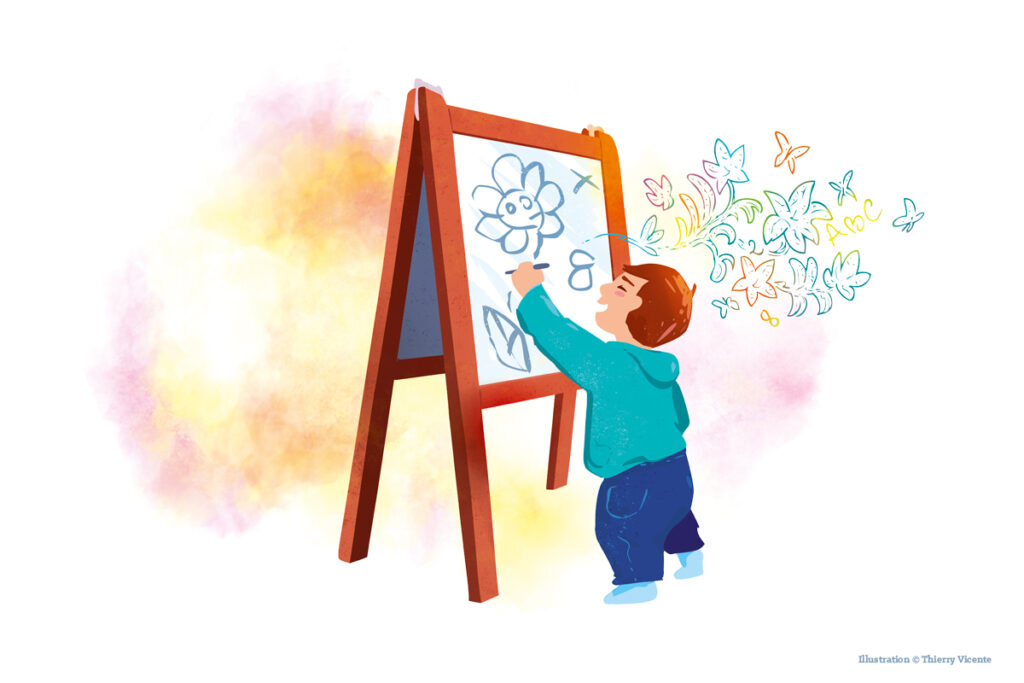[LUM#8] The nebula of alternative teaching methods
Which school should I choose? Which teaching method would be best for my child? How will they adapt to the pace of school? To the teacher? When choosing their children's education, some parents turn to alternative teaching methods. What are these new forms of education? Sylvain Wagnon, professor at the Faculty of Education at the University of Montpellier and head of the Center for Studies, Documentation, and Research in the History of Education in Montpellier (Cedrhe), explores the "nebulous" world of alternative teaching methods.

For the past decade, the media and, more recently, social networks have been promoting so-called alternative teaching methods. This is a new phenomenon that is difficult to define, as pointed out by Sylvain Wagnon, author of the book From Montessori to Positive Education: An Overview of Alternative Teaching Methods, who describes it as a "nebulous" concept. "We are not dealing with a structured group. The term 'alternative teaching methods' encompasses many very different schools and teaching methods. " Nevertheless, most of them present a discourse based on the personal and overall development of the child. "The values presented are mostly very altruistic, with notions of well-being, happiness, and kindness."
The promoters of these schools always emphasize the importance of respecting learning rhythms, physical needs, the development of autonomy, self-confidence, and cooperation between children. These schools favor active activities and small class sizes. "For example, there are so-called democratic schools that are developing rapidly in Montpellier and elsewhere. These are very small structures, most of them with fewer than fifteen children. In fact, the word 'school' is not really appropriate; they are more like different places of learning , " explains the researcher.
Inspired by new teaching methods
This discourse is far from new, as it draws inspiration from new teaching methods developed between the late 19th and early 20th centuries by now well-known doctors such as Maria Montessori and Ovide Decroly, as well as other figures such as Rudolf Steiner and Célestin Freinet. "At the time, these educators were already talking about the need to reform education and to think about teaching from the child's perspective. In fact, they talked about children, not students," explains Sylvain Wagnon.
But for this specialist in the history of education ( Eduquer autrement, une histoire ancienne), while new teaching methods have been developed around these great practitioners and theorists, alternative teaching methods refuse to define themselves exclusively in relation to these figures, who are considered historical. "They draw inspiration from Steiner, Freinet, Decroly, and especially Montessori, whose spirit they claim to embody, but they do not want to limit themselves to a single teaching method, and that is what is truly new. There is a great deal of variety, including certain movements that reject the very idea of pedagogy, such as some home schooling activists." This is a highly publicized form of education, but according to the researcher, it represents only a few thousand children out of the millions who attend school.
Anti-establishment
Like their predecessors (New Education as a Legacy), alternative teaching methods developed in response to traditional education, which was accused of failing to give children the means to flourish. Sylvain Wagnon also explains this criticism by referring to the history of the state education system established by Jules Ferry as "a common melting pot, a place for building French citizens. Even at the time, it was criticized for being like a barracks , where the group took precedence over the individual." While this system has the advantage of welcoming all children,it remains "very cumbersome and hierarchical, struggling to adapt to changes in society."
While the discourse surrounding these alternative teaching methods conveys very positive ideas (The Ideal of Positive Education), the researcher nevertheless warns against a lack of perspective and asserts the needto "analyze this emerging phenomenon without prejudgment, so as not to be satisfied with the prevailing discourse." For while these pedagogies have the merit of offering new avenues of work, they cannot avoid certain considerations.
To begin with, let us consider their definition; because although the discourse seems, at first glance, to be very positive, "the term 'alternative education' can cover just about anything, from libertarian schools to fundamentalist religious teachings." Put simply, this lack of a framework raises questions about teacher training and recognition, and the role of teachers. "Anyone can set up a Montessori school tomorrow if they want to. It will have the name but not necessarily the content."
A school outside society?
There is also the question of access to these alternative structures. With prices that can reach €5,000 per year or even much more, the claim that these educational approaches promote social diversity is severely limited by "the risk of withdrawal or exclusivity. We cannot use the words 'alternative' and 'democratic', which are very strong words, without asking ourselves the question of access for all."
Finally, we must question the purpose of these alternative teaching methods. Because while personal fulfillment remains at the heart of their discourse, can we really imagine a fulfilled but lonely individual? "There is an important purpose in education, which is living together, and we must not forget that ," concludes Sylvain Wagnon. "How we put that into practice is the whole charm of education."
Find UM podcasts now available on your favorite platform (Spotify, Deezer, Apple Podcasts, Amazon Music, etc.).